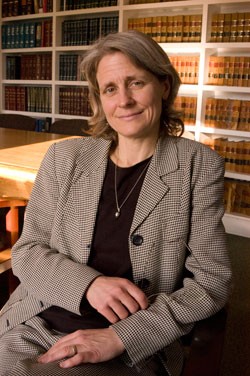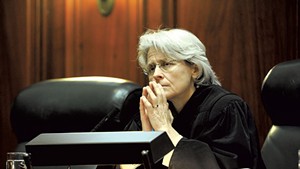
- Matthew Thorsen
- Beth Robinson
The Statehouse was unseasonably warm last Wednesday evening, as several hundred Vermonters packed into every nook and cranny of the House Chamber. Nearly 1000 others who couldn’t get inside found seats in other rooms and hallways throughout the building to listen to the public debate S.115, a bill to legalize same-sex marriages. Considering the temperature, the tight quarters, the trouble-plagued sound system and the controversial nature of the issue at hand, tempers could have easily boiled over.
They didn’t. Despite the heartfelt emotions this issue evokes, supporters and opponents throughout the building sat elbow-to-elbow, their loyalties apparent from affixed stickers and label pins: Some proposed, “From legal rights to equal rights”; others advocated, “Don’t change God’s plan: one man, one woman.” For two-and-a-half hours, they listened intently, quietly, respectfully and, according to capitol police, without incident.
Attorney Beth Robinson deserves a lot of credit for the peaceful gathering — and the overwhelming showing of supporters. And yet, the 44-year-old cofounder, chair and frequent spokesperson for the Vermont Freedom to Marry Task Force never stepped up to the mic. The unassuming leader of the movement stood quietly in a doorway — a proud witness to Vermont’s progress since the civil-union debate unfolded 10 years ago.
“What’s exciting about where we are now is that we’ve finally moved beyond having the conversation about whether we should have the conversation. We’re just having the conversation,” Robinson says. “Vermonters from across the state are engaged in it, and I think it speaks highly of our state.”
Robinson was one of the attorneys who successfully argued the 1999 Vermont Supreme Court case, Baker v. State, which led to Vermont’s civil-union law. But the battle hasn’t been won yet. On Monday night, the Vermont Senate voted in favor of same-sex marriage. But even if the bill gets through the House, it’s unclear whether Gov. Jim Douglas will sign it, and if he doesn’t, whether there are enough votes to override a veto.
Robinson was reluctant to be interviewed for this story, and some of her friends and coworkers opted not to talk about her with Seven Days. Was Robinson just being the savvy political strategist, exercising tight control over her group’s message at a critical juncture? Did she fear that a story focused on her leadership might distract lawmakers from arguing the merits of gay marriage itself?
Those who’ve known and worked with Robinson for years insist that her modesty is not opportunism. “The one thing I can say about Beth is that she would not want the story to be about her,” says Susan Murray, Robinson’s law partner at the firm of Langrock, Sperry and Wool and her co-counsel in the Baker case. One valuable lesson they learned from the civil-union debate, Murray says, was “the value of … getting people to tell their own stories.”
Robinson adds, “So many hundreds of people have spent so much time in this state getting us to where we are today. I just happened to have the good fortune in the last couple of years where I’ve gotten to be the face of it.”
More to the point, Robinson has been the driving force behind this movement. “Even when nothing was happening, when the press wasn’t paying attention to it, the legislature wasn’t paying attention to it and the gay and lesbian community might have felt a little apathetic, Beth kept plugging away,” Murray says. “She’s smart, she’s self-effacing and she’s indomitable.”
******
Robinson says she never had any particular aspiration to do gay-rights work when growing up in Indiana. She attended Dartmouth College, then the University of Chicago, where she earned a law degree in 1989. It wasn’t until after law school that she came out as a lesbian; she’s been in a 16-year relationship with her partner, Kym Boyman.
Robinson’s work on gay rights came about almost by accident. In the early 1990s, as a relatively new associate at Langrock, Sperry and Wool in Middlebury, she and Murray began “bumping into situations where our clients were suffering real injustices and hardships in their families because the law didn’t recognize a family where one existed.”
Around that time, the California Supreme Court was looking at the same-sex marriage issue, and gay-rights advocates all over the country were examining what their own states were doing, and whether litigation was the avenue for change.
At the time, Vermont had no case law on gay marriage per se, though Murray had represented a same-sex couple who’d been awarded a second-parent adoption — a precursor to the 1993 Vermont Supreme Court ruling establishing second-parent adoption statewide.
In fact, Robinson passed up an opportunity to take on a freedom-to-marry case in 1995 in order to help found the Vermont Freedom to Marry Task Force. Over the ensuing year and a half, she and other volunteers engaged in public discussions wherever they could on the gay-marriage issue, laying not only a legal framework for Baker, but also a political groundwork for its eventual acceptance by the public.
“Judges don’t live in a vacuum, and every judicial decision is subject to some sort of political response, whether it be statutory, executive or constitutional,” Robinson told a constitutional law symposium at Seton Hall University in May 2001. “It’s not enough to win the battle of the case if you go on to lose the war.”
In July 1997, Robinson, Murray and Mary Bonauto, a lawyer with Gay and Lesbian Advocates and Defenders, filed a lawsuit on behalf of three same-sex couples in Vermont who’d been denied marriage licenses from their town clerks. In December, the trial court rejected their arguments and dismissed the case; in November 1998, the three attorneys argued their case before Vermont’s highest court.
Beginning in the spring of 1999, Robinson and Murray arranged their work and vacation schedules so that at least one of them was on call every Friday, as the Supreme Court typically delivers its decisions on that day. Robinson tells how she even wore the same outfit every Friday because she thought it was the one best suited for a press conference.
As it turned out, the Baker decision was handed down on December 20, 1999 — a Monday — and Robinson raced home to change. But even then, her disappointment extended well beyond the court’s inconvenient timing.
You go to court seeking a remedy, Robinson explains, and her clients didn’t get one. Although the justices ruled that Vermont’s marriage laws were unconstitutional, they deferred to the legislature to determine how to best remedy the situation.
“In some senses, we were caught flatfooted by the court decision,” Robinson remembers. “We’d envisioned a win and we knew what that would look like, and we had envisioned a loss and we knew what that would look like.”
Moreover, within two weeks, the legislature was forced to take up the issue, a fight that neither side had expected nor prepared for. The scramble amongst the advocates was on.
******
Much has been written since 2000 about Vermont’s civil-union debate, and as Robinson herself points out, it’s taken on a mythology all its own. But 10 years later, she downplays how the ruling changed her own life.
“I had my 15 minutes, and then it passed,” she says dismissively. In fact, in speeches, articles and blogs written since, Robinson has tended to focus on how other people’s lives were changed by Baker and the civil-union law. Those people include lawmakers such as Republican Reps. John Edwards and Marion Milne, who in 2000 voted their consciences — and consequently lost their seats.
Admittedly, once civil unions became the law of the land in Vermont, some gay-rights advocates moved on to other issues. Although most acknowledged that the “compromise of 2000” was a less-than-satisfying result, many were resigned to leave it to future generations to finish the job.
Not Robinson. As she points out, the issue was never really settled. Most Vermonters forget, or never knew, that in 2002 a bill to repeal civil unions passed the Vermont House by just one vote. Although the measure failed in the Senate, it revealed just how tenuous civil unions still were.
It wasn’t until 2004, Robinson says, that the debate began shifting back toward full marriage equality. In December 2004, the Freedom to Marry Task Force hired Robyn Maguire as its field director, its first paid staffer. Maguire, who came to Vermont after working on the gay-marriage campaign in Massachusetts, remembers Robinson attending “countless” house parties, churches, county fairs and Rotary Club luncheons over the years. She’d listen to hundreds of stories and talk to people of all political persuasions about the reasons why a separate-but-equal system of civil unions wasn’t equal at all.
“Beth amazes me,” says Maguire. “I don’t know how she juggles everything she juggles, but she does. To be honest with you, I think she inspires people to do more and be more … just by her own example.” Whether people would join her on the slopes is another matter. Maguire notes that Robinson has a thing for sledding down Mount Mansfield. “Winters are centered around Beth’s sledding schedule,” she reveals.
Maguire recalls one time when she thought she’d do Robinson a favor by offering to attend a house party in her place, as it was being held on the opposite side of the state. Robinson graciously refused.
“Here I was thinking I was taking something off her plate on a Sunday, and she wants to go,” Maguire recalls. “But I think she values that one-on-one connection with the people who are doing this work or are genuinely struggling. In some ways, it’s part of what fuels her.”
Robinson became such an effective leader in this fight, Maguire continues, not only because she’s dialed into everything that’s going on within the organization, but also because she’s comfortable delegating authority and allowing others to lead.
“Beth has a real talent for knowing how to strike that balance,” Maguire adds. “She has her hands in everything and yet, she really does trust the people she works with and can say, ‘Here’s what I think we should do. What do you think? OK, let’s do it.’”
How did the gay marriage debate gain such political traction this year, especially during such dire economic times? If you ask Robinson, the decisive factor was California’s Proposition 8, which deprived same-sex couples the right to marry.
“I think many of us were stunned to see for the first time, in our lifetimes anyway, a civil right taken away,” Robinson says. “And, I think that energized a lot of people across the country, including here in Vermont.”
Rumors have been swirling, too, that Prop 8 also loosened a lot of out-of-state money for the cause. But Robinson claims that most of the support for the same-sex marriage campaign is homegrown within Vermont. Either way, the organization raised enough cash to hire the well-respected Montpelier-based lobbying firm of Kimbell Sherman Ellis for the job.
Euan Bear of Bakersfield takes a long view of the struggle for gay marriage. The former editor of Out in the Mountains, a now-defunct gay publication, argues that many straight Vermonters also got involved in the fight for marriage equality — in large part because of the work Robinson has done bringing the issue into the mainstream. As Bear puts it, Robinson “exhibited such courage and steadfastness and strategic thinking … I don’t know why everyone in the state doesn’t know who she is.”
Several lawmakers contacted for this story declined to comment on the record about Robinson, in light of the upcoming floor debates. Privately, however, they all remarked on her winning style of staying focused on the issues, instead of pointing out where her opponents are wrong.
“She’s incredibly respectful. I’ve never heard her say an unkind word to anybody or about anybody who disagrees with her,” notes Murray. “That’s not an act. That’s Beth.”
Some of the statements made by gay-marriage opponents last week would try even the most disciplined advocate. Gay marriage was variously referred to as “a sin,” “a violation of natural law” and an “abomination before God.” One wheelchair-bound man told lawmakers that the man who’d raped him years earlier had probably done so because he was gay.
But as Robinson explains, there’s nothing to be gained by denigrating the opposition, even if much of what she heard last week was discussed — and in her mind, settled — many years ago.
“The truth is, there are people of good will, honest, hardworking Vermonters, who are still trying to sort this out,” she says. Rather than picking on her fellow Vermonters, “I’d rather take advantage of every opportunity to talk to them.”











Comments
Comments are closed.
From 2014-2020, Seven Days allowed readers to comment on all stories posted on our website. While we've appreciated the suggestions and insights, right now Seven Days is prioritizing our core mission — producing high-quality, responsible local journalism — over moderating online debates between readers.
To criticize, correct or praise our reporting, please send us a letter to the editor or send us a tip. We’ll check it out and report the results.
Online comments may return when we have better tech tools for managing them. Thanks for reading.